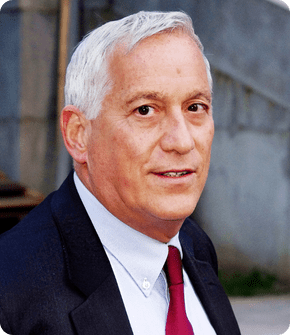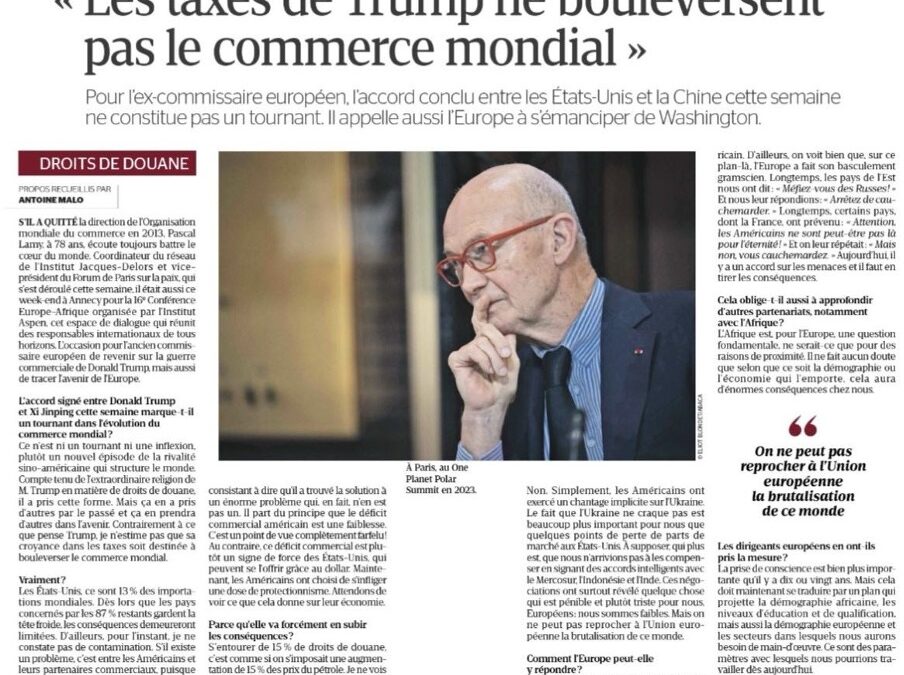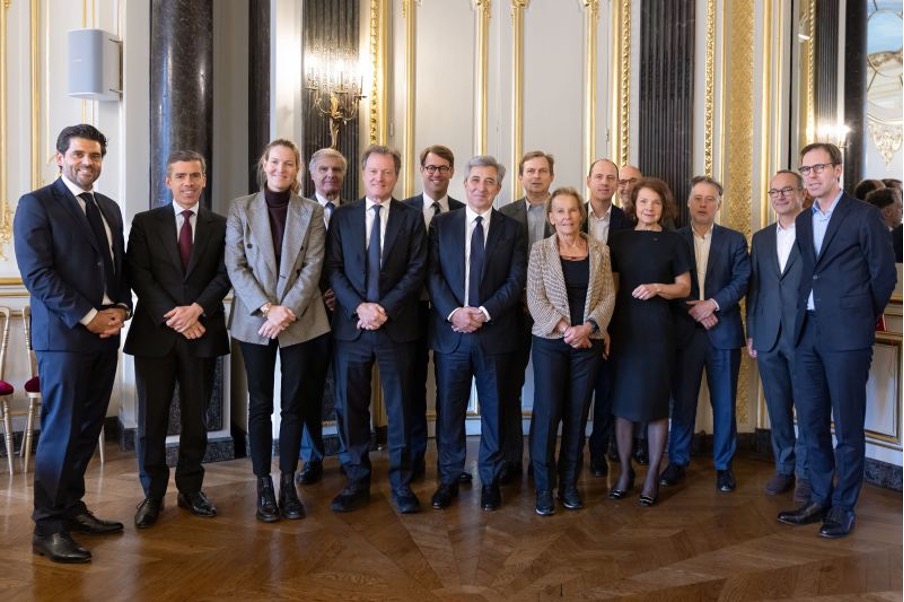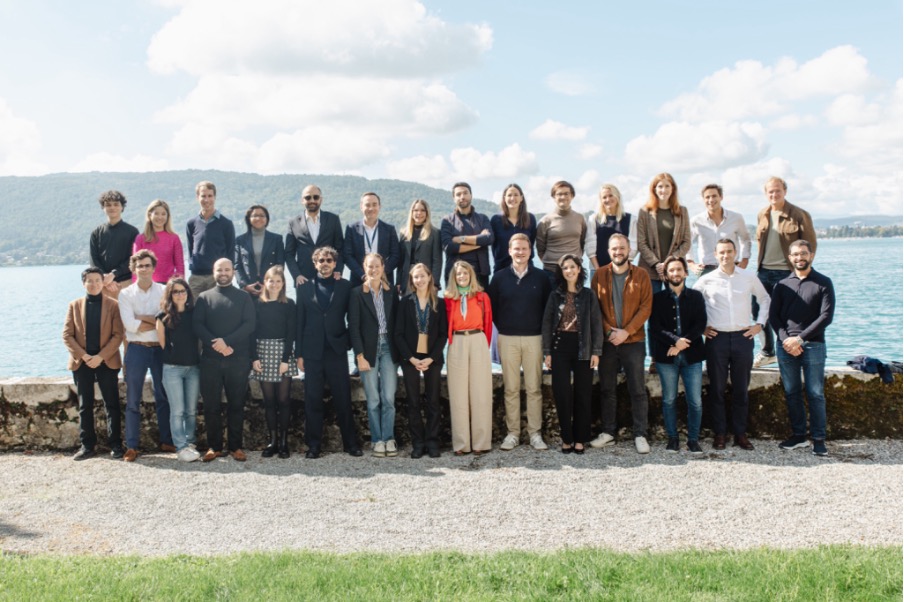United States : Quo Vadis ?

Walter ISAACSON
On April 15, Institut Aspen France had the pleasure of hosting renowned author and journalist Walter Isaacson for a Geopolitical Lunch moderated by Jean-Christophe Bas. Before an engaged audience, Walter Isaacson shared insightful reflections on the shifting world order, the rise of populism, and the impact of tech innovation on democracy. Drawing from his biographies of figures like Steve Jobs, Elon Musk, and his future one on Marie Curie, the conversation offered a rich and thought-provoking exchange on the future of global cooperation and the role of Europe in a rapidly changing geopolitical landscape.
Walter Isaacson is an American journalist, author, and professor known for his biographies of Henry Kissinger, Benjamin Franklin, Leonardo da Vinci, Albert Einstein, Steve Jobs, Jennifer Doudna, and Elon Musk. His work explores the lives of influential figures and their impact on history, science, and technology. Walter Isaacson has held key positions in the media industry, serving as editor of Time Magazine, chair and CEO of CNN from 2001 to 2003, and later as President and CEO of the Aspen Institute from 2003 to 2018. He has also been involved in public service, including as vice chair of the Louisiana Recovery Authority and as a member of the Defense Innovation Board. A Rhodes Scholar, he studied at Harvard University and Pembroke College, Oxford. Currently, he is a professor at Tulane University and a regular interviewer for Amanpour & Company on PBS and CNN.
I. The Crisis of the Liberal World Order and American Politics
Walter Isaacson opened with a reflection on the current disintegration of the post-WWII liberal world order, once anchored in the transatlantic alliance between Europe and the United States. This order, built on institutions like the IMF, World Bank, NATO, and ideas born from gatherings like at the Aspen Institute, is now being actively challenged by Trump’s America First movement. The withdrawal from globalism and distrust of alliances is not new in the U.S., but the intensity of the backlash—comparable to the rise of populism in Europe (Le Pen, Brexit)—is unprecedented. Trump, according to Walter Isaacson, is neither a realist in the Kissingerian tradition nor an idealist in the Wilsonian sense. Instead, he is a showman focused on performance and deal-making. His use of tariffs for negotiation purposes reveal a deeper shift in U.S. political culture. Meanwhile, the Democratic Party suffers from an identity crisis, torn between progressive cultural battles and a lack of a unifying economic message. The Republican Party, too, lacks figures willing to confront Trump’s influence. He raised the provocative question of what would happen if Trump defied a future Supreme Court decision.
II. Technological Disruption, Humanism, and the Role of Key Figures
As a biographer, Walter Isaacson reflected on his work with figures like Marie Curie, Steve Jobs, and Elon Musk to illustrate the tension between technological innovation and humanism. Marie Curie was highlighted as an emblem of the fusion between scientific rigor and humanist culture—a spirit that Walter Isaacson sees missing in contemporary tech leaders. While Steve Jobs viewed technology through a humanist lens, Elon Musk, in Walter Isaacson’s portrayal, is a talented but deeply complex figure driven by engineering ambition, emotional volatility, and a complicated relationship with authority. Musk’s influence on public discourse, through SpaceX or his media interventions, resembles Trump’s own disruptive style. Their shared attraction to power and rejection of institutional norms makes them “unstable molecules,” as Isaacson quipped, invoking Curie. Their potential “divorce” as political allies could be destabilizing for the tech and political landscape alike. The conversation also touched on the looming revolution in biotechnology, which Isaacson considers more profound than the digital one. He called attention to gene editing, synthetic biology, and cancer immunotherapy as the next frontiers—comparable in significance to the breakthroughs of the 20th century. Aspen, grounded in values and dialogue, remains a forum for these high-stakes ethical discussions.
III. Geopolitical Outlook: Europe, China, and the Role of Institutions
Walter Isaacson addressed the current geopolitical landscape, expressing concern over Trump’s effect on alliances and his transactional approach to diplomacy—especially regarding NATO, Ukraine, and China. Whereas Kissinger viewed diplomacy through a long-term realist lens (e.g., splitting China and the USSR), Trump’s impulsive and performative style alienates allies and empowers adversaries. His approach to the Ukraine conflict, for instance, is more about showmanship than strategic vision. Europe, in Isaacson’s view, must take the initiative: reinforce its defense capabilities, present a unified front on trade and tariffs (particularly toward China), and assert leadership in the preservation of democratic values. The erosion of transatlantic cooperation, he noted, is not irreversible—but depends on Europe’s ability to step up in the face of American retrenchment. He also drew parallels between the U.S. and France, observing the growing confusion and polarization in both societies. Figures like Jordan Bardella and Marine Le Pen may not yet be at the gates of power, but the structural conditions of their rise mirror those that enabled Trump. On a final note, Isaacson warned about the unchecked rise of generative AI and disinformation. Unlike the post-war era of institutional cooperation (Bretton Woods, the UN), there is currently no global consensus or mechanism to regulate AI. With actors like Musk or Trump openly challenging mainstream media and institutional authority, the information ecosystem—and democracy itself—is at risk.
We would like to thank Laura Battistelli-Pessanha, representative of EY, sponsor of the series of Déjeuners Géopolitiques.



